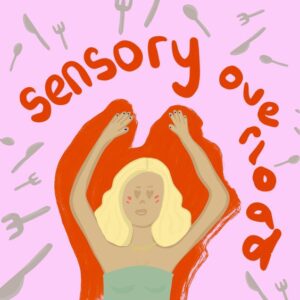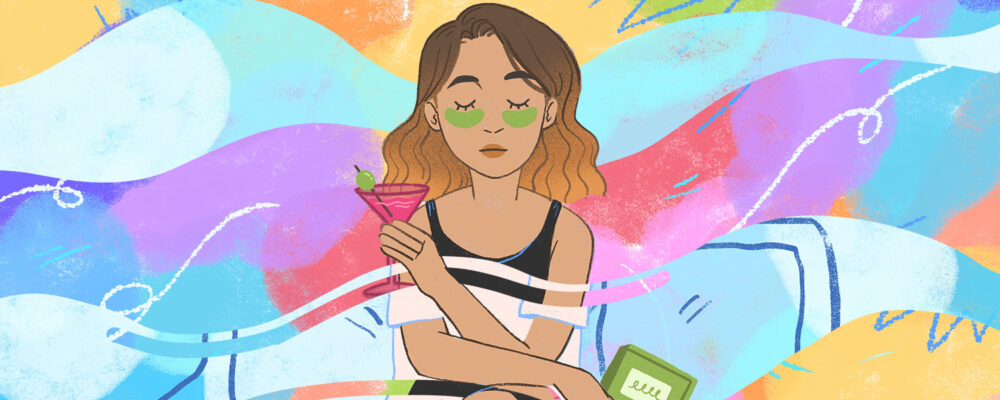Navigating Sensory Overload for Neurodivergent and HSP Individuals at Music Concerts
Music has the power to transport us to new worlds, epitomize the explosive fusion of sound and energy, and create unforgettable memories. But for neurodivergent audiences, particularly HSPs (Highly Sensitive People), attending music concerts can present unique challenges, and events can be a double-edged sword due to
sensory sensitivities. Explore what happens when they feel overwhelmed by the sonic tsunami and shed light on some sensory experiences they commonly seek during concerts.
Understanding Highly Sensitive People:

Before delving into the world of sound, let’s decode what it means to be Highly Sensitive. HSPs possess a finely tuned nervous system, making them more perceptive to sensory stimuli, emotions, and subtleties in their environment. HSPs not only exhibit heightened physical sensitivity but also an amplified emotional responsiveness to their surroundings.
While it is not typically categorized under neurodivergence in the same way as conditions like autism or bipolar disorder and is not a clinical diagnosis, some HSP individuals may consider themselves neurodivergent due to heightened sensitivity and unique ways of processing information. This identification is often influenced by the fact that many HSPs also grapple with additional neurodivergent conditions, broadening their experiences beyond heightened sensitivity to include factors such as attention-related challenges.
The term ‘neurodivergent’ encompasses a wide range of conditions and traits, diverging from typical neurological development, such as autism, ADHD, dyslexia, bipolar disorder, and more. The goal of using the term is to recognize and embrace the diversity of neurological experiences and promote understanding and acceptance of individuals with varied cognitive and emotional profiles.
Here is a Spotify playlist curated for HSPs:
The Concert Conundrum: Sensory Overload
Now, imagine being an HSP at a music concert. The pulse-pounding bass, blinding lights, and a sea of exuberant fans can quickly turn from exhilarating to overwhelming. The loudness of the music itself can trigger varied responses, ranging from intense enjoyment to discomfort or even panic. As the decibel level rises, and the stage lights flash, HSPs can experience a sensory overload like no other.
Research by Dr. Bianca Acevedo (UC Santa Barbara) finds that when HSPs are subjected to excessive sensory stimuli, their brains respond differently than those of non HSPs. The amygdala, the emotional control center of the brain, lights up like a Christmas tree, causing heightened emotional reactions. This means that what might be a celebration for some can feel like a sensory storm for HSPs.
Preparation Measures
So, what are HSPs seeking during this sensory maelstrom? There is a collective set of preferences among Neurodivergent and HSP individuals. Certain frequencies or volumes can be distressing, and bright or flashing lights may cause discomfort or disorientation. Surveys conducted among neurodivergent and HSP individuals indicate that these sensitivities often trigger panic responses and prompt early departures from concerts.
Many neurodivergent individuals take specific measures to navigate the challenges of music concerts and prepare themselves. These may include using earplugs or noise-canceling headphones to reduce auditory input, choosing intimate venues with lower noise levels, strategically positioning themselves away from speakers to minimize sensory overload, and opting for venues adorned with dim, ambient lighting to foster a soothing atmosphere.
Certain music genres, such as Lo-Fi, may be more accommodating for neurodivergent individuals due to their softer tones or calming melodies. Additionally, coping strategies such as familiarizing oneself with the music ahead of time, mentally preparing for the concert experience, or utilizing grounding techniques can help manage sensory sensitivities.
Dr. Sarah Connor, a neurodiversity advocate, explains, “While the specific needs of each group may vary, the underlying principle is creating inclusive spaces that allow everyone to enjoy the music on their terms.”
Awareness and Understanding Among Organizers and Attendees
Elevating awareness and fostering education become paramount to establishing concert spaces that are truly inclusive and accommodating.
During performances and event experiences, offer sensory-friendly performances, as well as quiet areas for attendees who need a break. The National Autistic Society in the UK hosts sensory-friendly concerts with lower volume levels and designated sensory spaces for individuals with autism, offering a more controlled and enjoyable experience.
The Louvre Museum in Paris provides sensory spaces equipped with calming sensory tools for visitors with sensory sensitivities. So, whether you’re an HSP, on the autism spectrum, or simply looking for a unique concert experience, remember music should be for everyone, and the sensory adventure is just beginning.
Enhancing Concert Experience: Tools and Accommodations
To make music concerts more accessible and enjoyable for neurodivergent individuals, various tools and accommodations can be implemented. These may include designated quiet zones for individuals to take sensory breaks, providing noise-canceling headphones or ear defenders, offering sensory kits with comforting items, and employing sensory-friendly lighting designs.
Surveyed HSP and Neurodivergent individuals’ preferences include quiet zones for respite, noise-canceling headphones, or ear defenders to reduce auditory input, sensory kits with fidget toys or weighted blankets for comfort, and sensory-friendly lighting designs that minimize intense visual stimuli.
In addition to sensory challenges, the social aspect of concert attendance can also impact the experience for neurodivergent individuals. Discomfort in large crowds and difficulties with social interactions may arise. Attending concerts with a known companion who understands and supports their needs can alleviate some of these challenges.
Recommendations for Tailoring Music Experiences
In the ever-evolving landscape of music consumption, creating inclusive spaces extends beyond concert venues to the digital realm of music streaming platforms.
From adjusting sound levels to incorporating ambient lighting, these measures offer a tangible solution for neurodivergent individuals seeking a harmonious experience amidst the sonic and visual intensity of live performances.
Simultaneously, music streaming platforms play a pivotal role in enhancing inclusivity by offering curated playlists that cater to the specific preferences of neurodivergent and HSP audiences. These playlists are intricately curated to showcase calming soft tones, including binaural beats, meditation music encompassing prayers and mantras, sound baths, and white noise. This deliberate selection aims to offer an alternative auditory haven.
As we consider the future of music, it becomes evident that both concert organizers and streaming platforms have the potential to revolutionize the way we experience it. This integration of awareness and accommodation across both live and digital platforms reinforce the idea that the magic of music is for everyone and the journey of sensory exploration is only just beginning.
By

